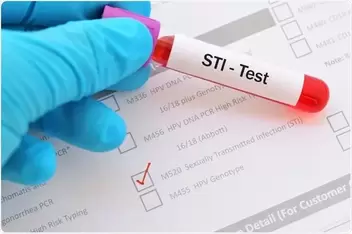STI (Sexually Transmitted Infection) and HIV/AIDS testing and counseling
If you think you may have a STI or HIV/AIDS or have been with a partner who has a STI or HIV/AIDS, please call for an appointment to get tested. All calls and appointments are CONFIDENTIAL.
For more information contact 217-357-2171 option 3.
Monday - Thursday, by appointment
If you think you may have a STI or HIV/AIDS or have been with a partner who has a STI or HIV/AIDS, please call for an appointment to get tested. All calls and appointments are CONFIDENTIAL.
For more information contact 217-357-2171 option 3.
Monday - Thursday, by appointment
More than 30 different bacteria, viruses and parasites are known to be transmitted through sexual contact, including vaginal, anal and oral sex. Some STIs can also be transmitted from mother-to-child during pregnancy, childbirth and breastfeeding. Eight pathogens are linked to the greatest incidence of STIs. Of these, 4 are currently curable: syphilis, gonorrhoea, chlamydia and trichomoniasis. The other 4 are incurable viral infections: hepatitis B, herpes simplex virus (HSV), HIV and human papillomavirus (HPV).
In addition, emerging outbreaks of new infections that can be acquired by sexual contact such as monkeypox, Shigella sonnei, Neisseria meningitidis, Ebola and Zika, as well as re-emergence of neglected STIs such as lymphogranuloma venereum. These herald increasing challenges in the provision of adequate services for STIs prevention and control.
In addition, emerging outbreaks of new infections that can be acquired by sexual contact such as monkeypox, Shigella sonnei, Neisseria meningitidis, Ebola and Zika, as well as re-emergence of neglected STIs such as lymphogranuloma venereum. These herald increasing challenges in the provision of adequate services for STIs prevention and control.
In accordance with federal civil rights law and U.S. Department of Agriculture (USDA) civil rights regulations and policies, this
institution is prohibited from discriminating on the basis of race, color, national origin, sex (including gender identity
and sexual orientation), disability, age, or reprisal or retaliation for prior civil rights activity.
Program information may be made available in languages other than English.
Persons with disabilities who require alternative means of communication to obtain program information (e.g., Braille,
large print, audiotape, American Sign Language), should contact the responsible state or local agency
that administers the program or USDA’s TARGET Center at (202) 720-2600 (voice and TTY)
or contact USDA through the Federal Relay Service at (800) 877-8339.
To file a program discrimination complaint, a Complainant should complete a Form AD3027, USDA Program Discrimination Complaint
Form which can be obtained online at: https://www.usda.gov/sites/default/files/documents/USDA-OASCR%20P-ComplaintForm-0508-0002-508-11-28-17Fax2Mail.pdf, from any USDA office, by calling (866) 632-9992, or by writing a letter addressed to USDA.
The letter must contain the complainant’s name, address, telephone number, and a written description of the alleged
discriminatory action in sufficient detail to inform the Assistant Secretary for Civil Rights (ASCR) about the nature
and date of an alleged civil rights violation. The completed AD-3027 form or letter must be submitted to USDA by: 1. mail: U.S.
Department of Agriculture Office of the Assistant Secretary for Civil Rights 1400 Independence Avenue, SW Washington, D.C.
20250-9410; or 2. fax: (833) 256-1665 or (202) 690-7442; or 3. email: [email protected].
This institution is an equal opportunity provider.
Updated 5/5/2022
institution is prohibited from discriminating on the basis of race, color, national origin, sex (including gender identity
and sexual orientation), disability, age, or reprisal or retaliation for prior civil rights activity.
Program information may be made available in languages other than English.
Persons with disabilities who require alternative means of communication to obtain program information (e.g., Braille,
large print, audiotape, American Sign Language), should contact the responsible state or local agency
that administers the program or USDA’s TARGET Center at (202) 720-2600 (voice and TTY)
or contact USDA through the Federal Relay Service at (800) 877-8339.
To file a program discrimination complaint, a Complainant should complete a Form AD3027, USDA Program Discrimination Complaint
Form which can be obtained online at: https://www.usda.gov/sites/default/files/documents/USDA-OASCR%20P-ComplaintForm-0508-0002-508-11-28-17Fax2Mail.pdf, from any USDA office, by calling (866) 632-9992, or by writing a letter addressed to USDA.
The letter must contain the complainant’s name, address, telephone number, and a written description of the alleged
discriminatory action in sufficient detail to inform the Assistant Secretary for Civil Rights (ASCR) about the nature
and date of an alleged civil rights violation. The completed AD-3027 form or letter must be submitted to USDA by: 1. mail: U.S.
Department of Agriculture Office of the Assistant Secretary for Civil Rights 1400 Independence Avenue, SW Washington, D.C.
20250-9410; or 2. fax: (833) 256-1665 or (202) 690-7442; or 3. email: [email protected].
This institution is an equal opportunity provider.
Updated 5/5/2022
